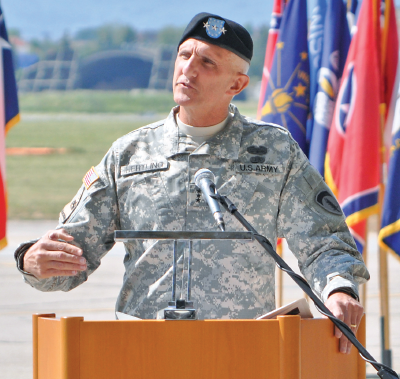Leaders can be “made.” You don’t have to be born one.
That’s the message that retired Lt. Gen. Mark Hertling—author of the 2016 book Growing Physician Leaders—hopes to bring to psychiatrists at this year’s Annual Meeting in New York. His presentation will follow the Opening Session on Sunday, May 6, which begins at 4:30 p.m.
Currently senior vice president at Florida Hospital in Orlando, Hertling hopes to share the lessons of military leadership and how those lessons can be applied in contemporary American health care. This was the message Hertling also presented during APA’s 2017 IPS: The Mental Health Services Conference in New Orleans in October.
“Leadership is leadership, no matter what profession you are in,” Hertling told Psychiatric News. “Many people think leaders are born, but in fact leaders can be ‘made’ if you learn the skills, focus on polishing them, and practice them in different situations.”
Hertling is the former commanding general of the U.S. Army Europe, where he led over 50,000 soldiers, oversaw the care of 100,000 family members, and partnered with the armies of 50 countries in the European theatre. He was an assistant division commander in Baghdad in 2003-2004 and later commanded the Army’s 1st Armored Division in Germany and in northern Iraq during the surge. After his retirement, Hertling was appointed by President Barack Obama and served for four years as one of 25 members of the President’s Council on Fitness, Sport, and Nutrition. He is an adjunct scholar at West Point’s Modern War Institute and serves as a military analyst for CNN.
“Many groups that want to learn more about leadership listen to life coaches or speakers who have only studied or read about these things, but my experience has allowed me to get a lot of scar tissue and to learn about the intricacies of applying leadership,” he continued. “I’m studying theory and academic approaches to leadership, and it’s becoming even more clear to me why we do what we do in the Army, and how it might be done in health care.”
At the IPS, Hertling said the principles of leadership are distilled in a military mantra that can be absorbed by 18-year-old recruits: “Be. Know. Do.”
•
Be: What kind of person are you? How do you carry yourself? How do others see you?
•
Know: What do you know about the world?
•
Do: Competencies build trust. How do you get people to do the right thing?
Over the past five years at Florida Hospital, Hertling has helped adapt the methods of “transformational leadership training” used for military professionals into a seminar on leadership attributes and competencies for health care professionals.
“The chief medical officer showed an interest in the way the military taught leadership and asked me to design a program and teach it once a month. Now we have over 300 graduates of the program, and it appears to be helping the organization,” Hertling explained.
Hertling said that he believes the principles of leadership can be applied to the challenge of physician burnout—a priority of APA President Anita Everett, M.D.
“I am currently doing a research study to address how the elements of leadership—especially the attributes of character and intellect as they are applied to one’s chosen profession—can counter burnout,” he said. “Any individual working at a tough job in a profession is susceptible to being ‘ground down’ if he or she is not centered in the values of the chosen profession. And you are more apt to be affected if you don’t think about who you are as a person and why you are doing the things you’re doing as part of a larger professional team.” ■

